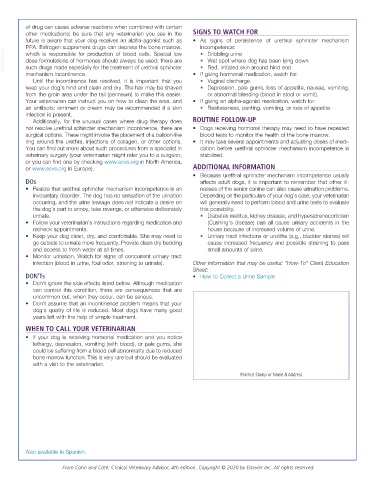Page 3138 - Cote clinical veterinary advisor dogs and cats 4th
P. 3138
of drug can cause adverse reactions when combined with certain
other medications; be sure that any veterinarian you see in the SIGNS TO WATCH FOR
future is aware that your dog receives an alpha-agonist such as • As signs of persistence of urethral sphincter mechanism
PPA. Estrogen supplement drugs can depress the bone marrow, incompetence:
VetBooks.ir dose formulations of hormones should always be used; there are • Wet spot where dog has been lying down
• Dribbling urine
which is responsible for production of blood cells. Special low
• Red, irritated skin around hind end
such drugs made especially for the treatment of urethral sphincter
mechanism incontinence. • If giving hormonal medication, watch for:
Until the incontinence has resolved, it is important that you • Vaginal discharge.
keep your dog’s hind end clean and dry. The hair may be shaved • Depression, pale gums, loss of appetite, nausea, vomiting,
from the groin area under the tail (perineum) to make this easier. or abnormal bleeding (blood in stool or vomit).
Your veterinarian can instruct you on how to clean the area, and • If giving an alpha-agonist medication, watch for:
an antibiotic ointment or cream may be recommended if a skin • Restlessness, panting, vomiting, or loss of appetite.
infection is present.
Additionally, for the unusual cases where drug therapy does ROUTINE FOLLOW-UP
not resolve urethral sphincter mechanism incontinence, there are • Dogs receiving hormonal therapy may need to have repeated
surgical options. These might involve the placement of a balloon-like blood tests to monitor the health of the bone marrow.
ring around the urethra, injections of collagen, or other options. • It may take several appointments and adjusting doses of medi-
You can find out more about such procedures from a specialist in cation before urethral sphincter mechanism incompetence is
veterinary surgery (your veterinarian might refer you to a surgeon, stabilized.
or you can find one by checking www.acvs.org in North America,
or www.ecvs.org in Europe). ADDITIONAL INFORMATION
• Because urethral sphincter mechanism incompetence usually
DOs affects adult dogs, it is important to remember that other ill-
• Realize that urethral sphincter mechanism incompetence is an nesses of the senior canine can also cause urination problems.
involuntary disorder. The dog has no sensation of the urination Depending on the particulars of your dog’s case, your veterinarian
occurring, and the urine leakage does not indicate a desire on will generally need to perform blood and urine tests to evaluate
the dog’s part to annoy, take revenge, or otherwise deliberately this possibility.
urinate. • Diabetes mellitus, kidney disease, and hyperadrenocorticism
• Follow your veterinarian’s instructions regarding medication and (Cushing’s disease) can all cause urinary accidents in the
recheck appointments. house because of increased volume of urine.
• Keep your dog clean, dry, and comfortable. She may need to • Urinary tract infections or uroliths (e.g., bladder stones) will
go outside to urinate more frequently. Provide clean dry bedding cause increased frequency and possible straining to pass
and access to fresh water at all times. small amounts of urine.
• Monitor urination. Watch for signs of concurrent urinary tract
infection (blood in urine, foul odor, straining to urinate). Other information that may be useful: “How-To” Client Education
Sheet:
DON’Ts • How to Collect a Urine Sample
• Don’t ignore the side effects listed below. Although medication
can control this condition, there are consequences that are
uncommon but, when they occur, can be serious.
• Don’t assume that an incontinence problem means that your
dog’s quality of life is reduced. Most dogs have many good
years left with the help of simple treatment.
WHEN TO CALL YOUR VETERINARIAN
• If your dog is receiving hormonal medication and you notice
lethargy, depression, vomiting (with blood), or pale gums, she
could be suffering from a blood cell abnormality due to reduced
bone marrow function. This is very rare but should be evaluated
with a visit to the veterinarian.
Practice Stamp or Name & Address
Also available in Spanish.
From Cohn and Côté: Clinical Veterinary Advisor, 4th edition. Copyright © 2020 by Elsevier Inc. All rights reserved.

